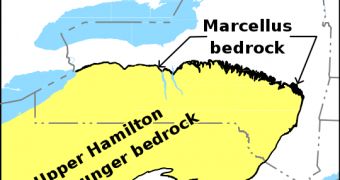Nowadays, companies struggle to fight the energy crisis by exploiting both traditional sources of power and renewable alternatives. The current price of natural gas makes this resource appealing.
However, the technology used to obtain it is highly controversial, since experts now warn that it could contaminate water in New York, the Guardian informs.
Hydraulic fracturing is a complex process in which chemicals mixed with sand and water are injected into rocks to make them crack and release valuable natural gas.
The assumption that elements used during this process could lower water quality and put residents' health at risk is not entirely new, since it was taken into consideration last year by EPA officials, who have correlated water poisoning with hydraulic fracturing, triggering the anger of major players operating in this line of business.
This time, the warning comes from the Department for Environmental Conservation (DEC), highlighting that a potential removal of a fracking ban in New York would “struck the right balance between protecting our environment, watersheds and drinking water and promoting economic development.”
The usage of chemicals in the Marcellus shale located in New York is cataloged as “insane” by Paul Hetzler, a former technician, analyzing and handling groundwater contamination at the DEC.
“I'm not saying anywhere you drill will cause a huge catastrophe. There might be a location where geological conditions are favorable, where contaminants don't travel. But the Marcellus shale is not a homogeneous layer. You can't predict what is going to happen,”explained Hetzler for the Guardian.
This disturbing hypothesis could be backed by the chain of earthquakes recorded in Ohio, considered a potential result of irresponsible fracturing operations.
The Marcellus shale, stretching from Ohio and West Virginia to Pennsylvania and New York contains significant untapped natural gas reserves, and its strategic position and economic importance make it a great asset for the high-demand markets along the East Coast of the United States.
The operations could hide unpredictable risks, noticeable in the long term, threatening water quality in New York. Meanwhile, DEC is having a hard time managing the situation, because of its lack of personnel.
On the other hand, strict regulations eliminating uncertainties in this line of business are expected later this year.

 14 DAY TRIAL //
14 DAY TRIAL //